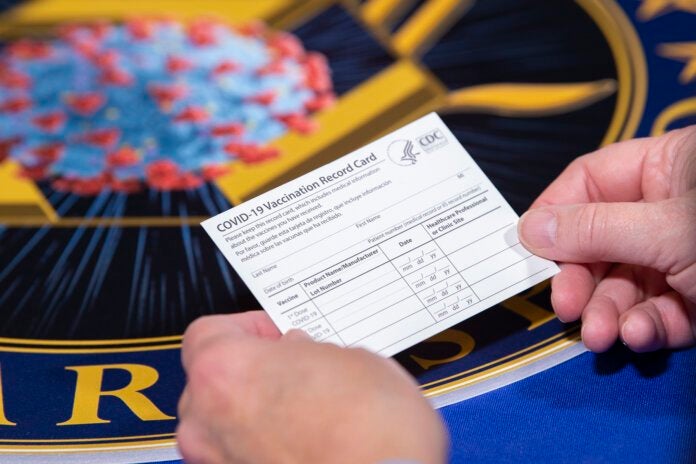The Vax Up Augusta! Program, which gives $200 in incentives to people who get both shots of the COVID-19 vaccine, is suffering from accountability issues. Meanwhile, the City Administrator’s office refuses to answer basic questions on the program.
The program, in effect since late September, has the goal of providing between 8,300 and 10,000 vaccinations to Augusta residents, but early on, the program was only reaching between 5% and 6% of the goal. The Augusta Commission voted in a special session on Oct. 26 to expand the incentive plan by authorizing the $100 dollar gift card incentive to be given for both shots of the Pfizer and Moderna vaccines rather than requiring full vaccination to receive a gift card.
To date, only roughly 1,590 people have taken the vaccine and received gift cards, and that number may not be correct because there is no central administration of the program. That approximate figure is a combination of numbers presented by City Administrator Odie Donald to the commission on Oct. 26 combined with the last drive-through clinic held on Oct.30 at the James Brown Arena.
The Richmond County Health Department is only tracking the vaccination numbers and money spent through the health department, according to a spokesperson for the department. Four other organizations, Christ Community Health, Medical Associates Plus, Nightingale Infusion and Pharmacy and the Augusta University Student Health Clinic are offering the incentives as well.
Requests for documents from the health department had to be submitted twice due to inaccuracies, and even the final submission contained errors.
[adrotate banner=”51″]
According to the health department’s records, the county spent $91,775 on shipping the gift cards. The cost of overnighting the cards through FedEx in a 25 package package from Augusta to Honolulu would only be $88, according to a FedEx representative.
The health department ledger also shows $18,952.98 has been spent on “indirect costs,” but there is no explanation of what those costs include. The total expense of the program, which includes activation fees, office supplies, shipping and security services, amounts so far to $26,883, which means the city has spent more money giving out the incentives than the actual dollar figure of incentives given out.
District 4 Commissioner Al Mason says he has seen the financial reports and the accounting doesn’t make any sense to him.
The figures listed above do not include the $25,000 allocated for advertising because the city has not released how much has been spent of that allocation.
Another line on the ledger report shows $82,500 allocated for administrative fees, and a total cost to the city, to date, of $191,884.295.
According to the health department’s ledger, the city has pre-purchased 3,300 cards for a total face value of $330,000. However, the ledger does not show how many cards were given to each vendor, and no tracking mechanism has been set in place to prevent fraud.
The gift cards being handed out work the same way as a gift card purchased at any store. Once a gift card is loaded with cash, it cannot be refunded and becomes virtually untraceable.
Danielle Harris, the public information officer for the Administrator’s Office, said she did not take questions by phone and demanded they be sent in writing. She has not responded to questions sent by email.
District 8 Commissioner Brandon Garrett, who cast the lone “no” vote for expansion of the program, said he is “greatly disturbed” by the lack of accountability.
The funding for the program does not come from the city’s general fund but from federal funding through the Coronavirus Aid, Relief and Economic Security Act (CARES); however, Garrett says that doesn’t matter to him as it is all taxpayer’s money regardless of the source.
Despite having been publicly scolded by Mayor Hardie Davis for having reservations about the program, Garrett says that he will not be sticking to the mayor’s script.
“We’re talking about blank gift cards here. We have to know where those blank cards are being kept and how they are being handed out. There has to be accountability,” Garrett said.
Mason agrees with Garrett and says that the soaring administrative costs looks like a “money grab” to him. Mason says that there needs to be a standardized procedure on giving out the cards.
“We have got to wrap our heads around this and make sure that we are accounting for each card. I’m not accusing anyone of fraud or stealing, but if you leave that door open, it could happen,” Mason said.
Scott Hudson is the Senior Reporter for The Augusta Press. Reach him at scott@theaugustapress.com











